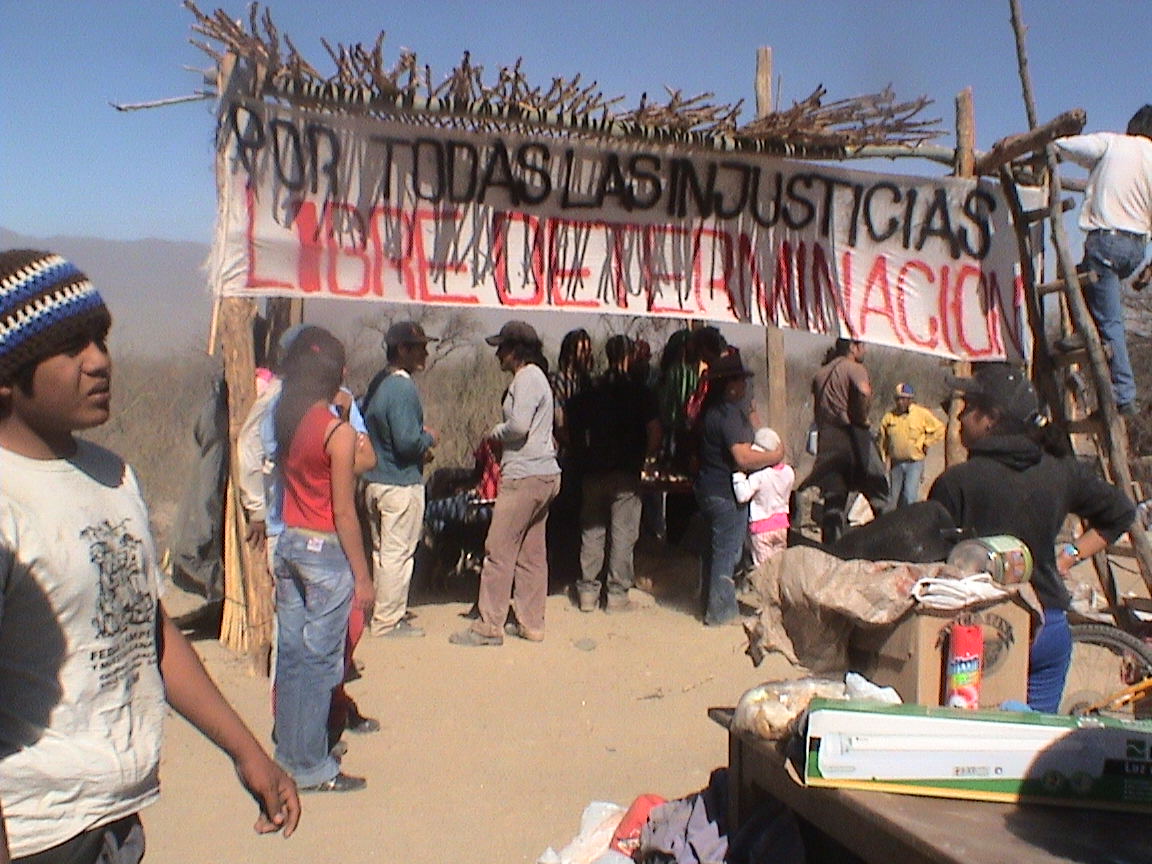
Despite Argentina’s blanket ban on evictions of Indigenous communities, the Quilmes community of Colalao del Valle is facing its third eviction attempt in three years. Police officers already tried to disperse the community on April 29th; but the community, which is attempting to reclaim ancestral lands, resisted. Amnesty International sends this international appeal to support the Quilmes community.
URGENT ACTION
INDIGENOUS FAMILIES AT RISK OF FORCED EVICTION
Four Indigenous families are at risk of imminent forced eviction from their homes in the northern Argentinian province of Tucumán. They could face violence from the police and the loss of their homes and livelihoods.
On 30 May a judge based in the northern Argentinian city of San Miguel de Tucumán rejected the request by the Quilmes Indigenous community of Colalao del Valle to stop the eviction order against the families. Members of the community were evicted on 17 September 2009 and 5 January 2010 from four hectares of land which are claimed by the community and by a company. On both occasions they reoccupied the land days later. Police officers accompanied by a local judge tried to evict them for a third time on 29 April 2011, but the community resisted the eviction. Several community members and police officers were wounded in the clashes. The 30 May decision has given the authorities the go-ahead to attempt a new eviction. Currently around 30 people, including 10 children, live on the disputed land.
Evicting Indigenous communities is currently forbidden under Argentinian legislation. Laws 26,160 and 26,554 have established a blanket ban on evictions of Indigenous communities from 23 November 2006 to 23 November 2013 while a nationwide survey is carried out to define Indigenous territories.
PLEASE WRITE IMMEDIATELY in Spanish or your own language :
Expressing concern at the risk of a new forced eviction against four families of the Quilmes Indigenous community of Colalao del Valle;
Urging the authorities to refrain from carrying out this forced eviction and any other forced eviction against Indigenous communities in any part of the country, as established by national laws 26,160 and 26,554;
Calling on the authorities to ensure that those officials who order or carry out forced evictions against Indigenous communities are brought to account.
Reminding the authorities that they should take all possible measures to respect Indigenous rights as established by the 2007 UN Declaration on the Rights of Indigenous Peoples and the 1989 International Labour Organization’s Convention 169.
PLEASE SEND APPEALS BEFORE 14 JULY 2011 TO :
Minister of Justice and Human Rights
Dr. Julio César Alak
Ministro de Justicia y Derechos Humanos
Sarmiento 329, C.P. 1041, Buenos Aires, Argentina
Fax: (+54) 11 4328-0865
Email: privada@jus.gov.ar
Salutation: Dear Minister/Estimado Señor Ministro
Governor of Tucumán Province
Cr. José Jorge Alperovich
Gobernador de la Provincia de Tucumán
Casa de Gobierno, 25 de mayo 90, C.P. 4000, San Miguel de Tucumán, Argentina
Fax: (+54) 381 484-4003
Email:privadagobernador@tucuman.gov.ar
Salutation: Dear Governor/Estimado Señor Gobernador
And copies to:
Quilmes Indigenous Community
Comunidad India Quilmes
Ruta 40 Km. 4292
Colalao del Valle, Tafí del Valle, C.P. 4141,Tucumán Province, Argentina
Also send copies to diplomatic representatives accredited to your country. Please check with your section office if sending appeals after the above date. Further information: http://www.amnesty.name/es/library/info/AMR13/002/2009/es
ADDITIONAL INFORMATION
The Indigenous Quilmes people consist of around 3,000 people and most of them live in the north-western Argentinian province of Tucumán. The community of Colalao del Valle is one of the biggest Quilmes communities with approximately 1,000 inhabitants.
Provincial authorities have also evicted nearby Indigenous communities and some of their leaders have been attacked for defending the land that they claim as theirs. Indigenous leader Javier Chocobar from the community of Chuschagasta was killed on 12 October 2009 in an apparent reprisal for his work to secure land tenure for his community. A local land owner and two former police officers have been accused of the crime. The case will go to court in 2012.
Police officers tried to forcibly evict the Indigenous community of El Nogalito on 22 and 25 September 2009. Indigenous leaders Manuel Joaquín Pérez and Margarita Mamaní have reported death threats and intimidation in relation to their campaign to secure land tenure for El Nogalito. On 13 October 2010 an envelope containing bullets was left at Manuel Pérez’s home. On 10 March 2011 a man left him a voice message on his mobile phone threatening to kill Manuel Pérez and saying that he was following Manuel Pérez’s son. On 31 March he received a death threat by SMS text message. Margarita Mamaní received her latest death threat on 26 April. Although all the incidents have been reported to the authorities, nobody has been brought to account and no protection has been offered to the Indigenous leaders and their communities.
Pressure over the ancestral land of Indigenous communities could rise in Argentina as the deadline for resuming evictions approaches and the national survey on Indigenous land fails to make substantial progress. In the meantime, forced evictions continue to take place as some local and provincial authorities fail to respect national laws 26,160 and 26,544. Indigenous lands are sometimes claimed by private individuals, companies or official entities in order to develop projects for their own benefit.
The 2007 United Nations Declaration on the Rights of Indigenous Peoples, which Argentina has openly supported, establishes that “Indigenous peoples shall not be forcibly removed from their lands or territories” and that “Indigenous peoples have the right to maintain and strengthen their distinctive spiritual relationship with their traditionally owned or otherwise occupied and used lands”.

Indigenous Peoples are putting their bodies on the line and it's our responsibility to make sure you know why. That takes time, expertise and resources - and we're up against a constant tide of misinformation and distorted coverage. By supporting IC you're empowering the kind of journalism we need, at the moment we need it most.